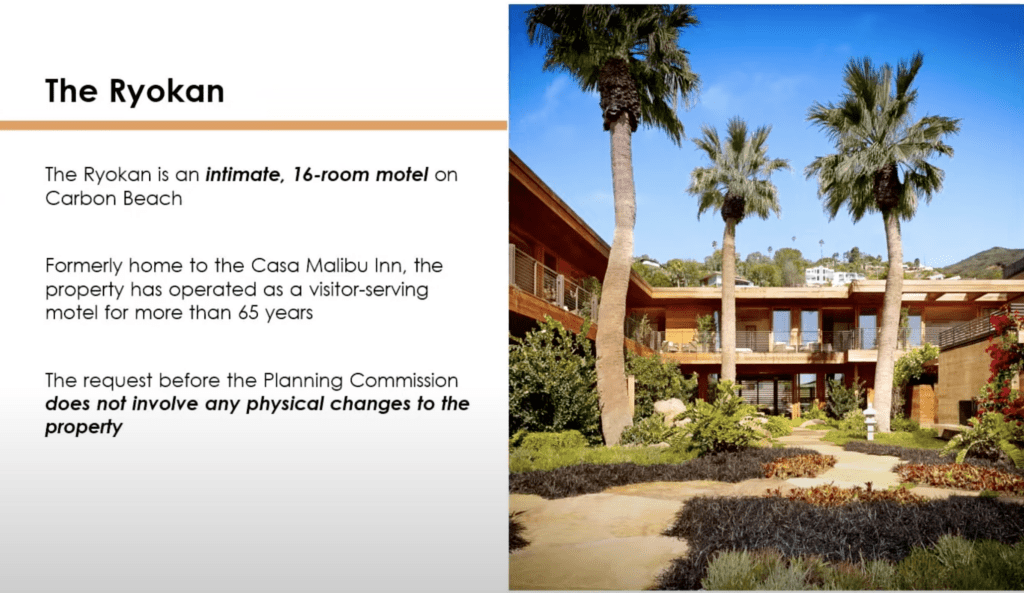Nobu Ryokan Motel and Tidepool Health Club intend to become bed and breakfast inn, seek liquor license
By Barbara Burke
Special to The Malibu Times
On Nov. 6, the Malibu Planning Commission deferred its consideration of an application by the owners of the Nobu Ryokan Motel and the Tidepool Health Club to change the properties’ uses from a motel and adjacent health club to a bed and breakfast inn with a private gym available only to guests. The matter is now slated for the commission’s consideration on Dec. 18 at a special meeting.

Commissioners John Mazza and Kraig Hill expressed grave concerns concerning a lack of clarity with regard to several matters relating to the application as well as concerning various historical details relating to the parcels. Commissioners Skylar Peak and Drew Leonard joined Mazza and Hill in voting to defer the matter, with Commissioner Dennis Robert Smith dissenting.
The application asks for the city to authorize a combined facility, merging the two commercially developed beachfront parcels via a lot tie so that they cannot be separately sold, a covenant that will run with the land unless the city releases that restriction.
The proposed development and uses would include a bed and breakfast inn and lobby providing lodging accommodations consisting of 17 guest rooms with kitchen facilities adequate to provide meals to guests only, a 300-square-foot gym, a 600-square-foot swimming pool, and a deck. The swimming pool would close at 10 p.m. every night, and noise emanating from the premises shall not be audible at a distance of 5 feet of any neighboring building between the hours of 10 p.m. and 7 a.m., as required by Malibu Municipal Code Section 8.24.050(L). Further, the applicant will agree to comply with MMC Chapter 9.24 (Ban on Plastic Food Packaging and other Plasticware), and will not allow any food packaging that utilizes expanded polystyrene, sometimes referred to as styrofoam, a Dow Chemical Company trademarked form of polystyrene foam.
The application also seeks the commission’s approval of a proposed conversion of office space in the health club to a new guest suite with a kitchenette and authorization for the city planning director to issue a letter of public convenience or necessity for the sale of alcohol for onsite consumption by guests only either on the deck or for room service, a possible condition precedent to the applicants’ applying to the Alcohol and Beverage Control Board for a license to serve beer, wine, and distilled spirits in the private gym. The proposed hours for alcoholic beverage service are from 10 a.m. to 10 p.m., Sunday through Thursday, and from 10 a.m. to 11 p.m. on Friday and Saturday. The motel currently has a liquor license.
Commissioners’ concerns regarding the application
Mazza stated that combining the parcels and allowing amenities such as a swimming pool, a gym, the sale of alcohol to guests, and meal service from morning to late evening would expand the character of the property to be tantamount to a hotel, not a bed and breakfast. Mazza noted that a hotel designation would require almost twice the parking than currently exists on the property as relevant law states that a hotel must have two parking spots per room and one parking spot for each staff member.
Hill opined that adding another guest suite on the parcel as well as allowing room service and the serving of breakfast, lunch, dinner, and drinks would constitute an intensity of use of water and sewage which should perhaps be considered by the water district.
“It is unclear if the city ever issued a letter of public convenience or necessity for the sale of alcohol for onsite consumption at the motel,” Mazza stated. “I think that staff should search to find out the answers about that as well as about why the applicant is requesting a zoning reclassification to CV-2, which would allow the applicant to change the character of the property to a full hotel in the future without having to get permission from the city. That is a big gift and I wonder how that can be justified under the city’s laws? For a bed and breakfast, all the applicant needs is a CV-1 zoning classification.”
Such “upzoning” also seriously concerned Hill, who also stated that in his mind, the ancillary uses proposed on the property, such as a gym, alcoholic service and food service all day resulted in the proposed property constituting a hotel.
Jo Drummond, president of the Malibu Township Council, expressed concerns about the parking not being sufficient, but also stated that the proposed establishment “is a hotel, not a motel or an inn, because the parking spots are not directly outside the room doors and the property has accessory uses such as all-day dining, alcohol service, massages, and a gym … Because it is not zoned for hotel use a Local Coastal Plan Amendment needs to be completed.”
Drummond also noted that the proposed hotel “does not meet section 30212 of the Coastal Act to provide lower-cost visitor facilities when feasible.”
The staff will conduct an investigation into all of the concerns expressed before the meeting on Dec. 18.

